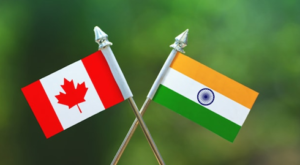Diaspora, distrust, distance
Why it will be hard to mend the relationship between India and Canada
Relevance
- GS Paper 2 Bilateral, regional and global groupings and agreements involving India and/or affecting India’s interests.
- Effect of policies and politics of developed and developing countries on India’s interests, Indian diaspora.
- Tags: #canada #khalistan #india #internationalrealtions #currentaffairs #upsc
Why in the News?
India expelled Canadian diplomat in retaliation.
Introduction
Relations between Canada and India have hit rock bottom, triggered by Prime Minister Justin Trudeau’s allegations that Indian agents were involved in the murder of Khalistani activist Hardeep Singh Nijar. The subsequent expulsion of diplomats has left little room for reconciliation. To repair this strained relationship, it is imperative to engage in a comprehensive political dialogue addressing the role of Canada’s Indian diaspora, their political influence, and its impact on Canada-India relations.
Historical Rollercoaster
- Canada-India relations have oscillated over the past five decades. During the Cold War, commonwealth status and shared beliefs in multilateralism and global development fostered amicable ties.
- However, differences during Cold War crises, India’s nuclear program, and limited trade and security prospects hindered diplomatic engagement.
- Renewed interest emerged in the 1980s with increased Indian immigration, and today, trade and investment are central to the relationship.
- Nevertheless, these promising aspects are overshadowed by a toxic diaspora politics that threatens unity and stability in India.
Trudeau’s Troubling Accusations
- Prime Minister Trudeau’s allegations of Indian involvement in Nijar’s murder are unprecedented and troubling. Regardless of their veracity, accusing a G20 nation of extraterritorial killing is a significant diplomatic development.
- Ottawa’s claims, ostensibly backed by intelligence, escalated the situation. However, Trudeau’s focus on the ‘rule of law’ overlooks the impact of Nijar and his separatist supporters’ activities in both Canada and India.
- Some have propagated violence against Indian diplomats, celebrated the death of an Indian prime minister, and were involved in the 1985 Air India bombing.
- Trudeau’s emphasis on Khalistani activists’ plight without addressing their harm to India undermines his ‘rule of law’ stance.
Diaspora Politics: A Double-Edged Sword
- The Indian diaspora plays a pivotal role in Canada’s domestic politics and foreign policy.
- While many contribute positively to Canada’s multicultural fabric, a subset harbors deep-seated animosity towards India, actively working against its interests. Wealthy NRIs, influential in remittances and networks, have inadvertently bolstered India’s strategic ties with the United States.
- Yet, the diaspora’s polarized views and actions pose a significant challenge, demanding careful management.
The Impact of Diaspora in the Digital Age
- In the digital age, diaspora groups’ influence is Recent pro-Khalistan protests in the US, UK, Canada, and Australia have turned violent and divisive.
- Digital technologies enable diaspora groups to disseminate their ideologies globally, impacting borders. Civil society groups increasingly challenge Modi’s foreign visits, demanding attention to human rights and highlighting caste discrimination.
- Digital platforms are facilitating the spread of ideas and activism, complicating diplomatic relations.
Reframing Canadian Foreign Policy
- Canada’s deference to Khalistani groups and other diaspora elements has been a recurring issue. Both Liberal and Conservative governments have pandered to these groups, jeopardizing national security and foreign policy.
- It is imperative to break this pattern and engage with the Indian diaspora more constructively, addressing their diverse political outlooks, linguistic choices, and ideological affiliations.
Challenges Ahead
- Mending the rift between India and Canada requires a multifaceted approach. Distrust has roots dating back decades, and grievances run deep.
- Both nations share interests in defending the international order, countering China’s rise, and cooperating on global challenges like climate change and public health. However, this necessitates a political compact that redefines how both countries view Canada’s Indian diaspora.
- By mitigating the worst impulses of diaspora elements and fostering constructive engagement, Ottawa and Delhi can bridge the considerable gap in their relations.
Conclusion
The strained relationship between India and Canada is a result of complex dynamics involving diaspora politics, historical tensions, and recent allegations. To rebuild trust and mend the rift, both nations must engage in a comprehensive political dialogue that addresses the role of Canada’s Indian diaspora and its influence on bilateral relations. The challenges are substantial, but by reframing foreign policy, promoting constructive engagement, and focusing on shared interests, the path to reconciliation becomes more feasible.
|
India-Canada Bilateral Ties in a Nutshell Bilateral Mechanisms
Commercial Relations
Nuclear Cooperation
Science and Technology
Space
Security and Defence
Agriculture
Education
People-to-People Ties
Cultural Exchanges
Cooperation in COVID-19 Pandemic
|
Sources: Indian Express
Mains Question
“Analyze the recent allegations and their implications for diplomatic ties. How can both countries navigate the complexities of diaspora politics to rebuild trust and strengthen bilateral relations in the digital age? Provide insights into the historical context and potential solutions.” 250words.





